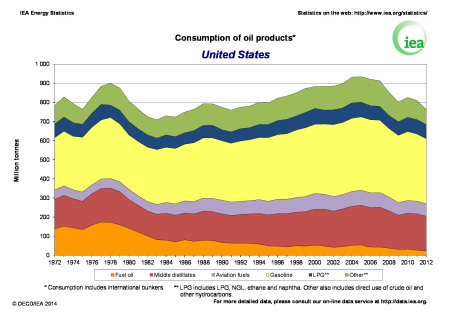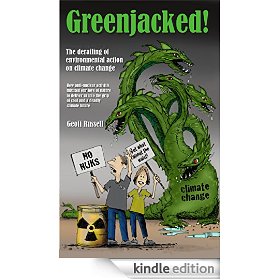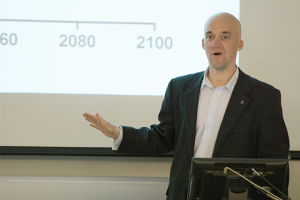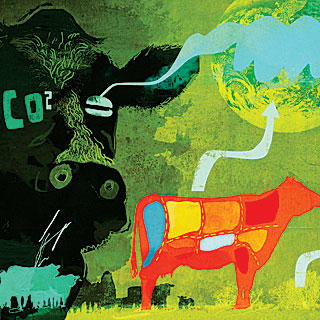I’m still in the process of moving house (I’ve now arrived in Tassie, but my furniture is still in transit…). But I have my Notebook computer, so I’m set, right?
Anyway, on the weekend I had time, over a large coffee, to read through Will Boisvert‘s essay on pastoral fantasies and the alternative ‘high energy planet’ (a critique of Naomi Klein’s new book). It is absolutely brilliant, and I immediately thought it was a perfect exposition of the philosophy that developed on BNC over the last 5 years, in reaction to the global sustainability challenge. Anyway, I asked Will, and Michael Shellenberger from The Breakthrough Institute (who published the original article) if I might reproduce it here on BNC, and they graciously agreed. So here it is.
Read this (please!), and think carefully. We must all think and act rationally to tackle this challenge. There is no room for cognitive dissonance or denial, whatever ‘side’ you feel you are on.
Why Progressives Should Reject Naomi Klein’s Pastoral Fantasy — and Embrace Our High-Energy Planet

Liberal and progressive politics used to embrace energy, technology, and modernity for human liberation and environmental quality. Today it embraces a reactionary apocalyptic pastoralism epitomized by Naomi Klein’s latest, This Changes Everything: Capitalism vs. the Climate. As such, Klein’s book is symptomatic of the Left’s disturbing turn against progressive, pragmatic action for people and the environment.
Ever since Marx’s day, leftists have been straining to spy the terminal crisis of capitalism on the horizon. It’s been a frustrating vigil. Whatever the upheaval confronting it — world war, depression, communist revolution, the Carter administration — a seemingly cornered capitalism always wriggled free and came back more (and occasionally less) heedless, rapacious, crass, and domineering than before.
Now comes global warming, a cataclysm seemingly so dire that it cannot be finessed with reformist half-measures, so all-encompassing that capitalism would have to leave the planet to dodge it. For many on the Left, capitalism is at the heart of climate change: the crisis of over-combustion stems from the capitalist dynamic of overproduction and overconsumption, all driven by the logic of over-concentration of profits in the hands of the wealthy few. And nothing will resolve the crisis, the Left hopes, but the transformation of every aspect of the world capitalism has made — to pull consumerism, waste, hierarchy, competition, trade and alienation up by the roots and replace them with a political economy of sufficiency, recycling, egalitarianism, cooperation, localism, and nature.
It was almost inevitable that Naomi Klein, the Left’s preeminent celebrity journalist, would make herself the mouthpiece of this mind-wave. The Canadian writer-pundit and Nation columnist is a master of broad frameworks and far-reaching implications. She has already written two books — No Logo, on the corporate takeover of culture, and The Shock Doctrine, on the neoliberal take-over of economies — that crystallized huge clouds of progressive discontent into catchy memes. Her trademark blend of light wonkery, sardonic prose, sharp-eyed reportage and fist-waving militance appeals to every left constituency from academics to Occupiers. Most important, her penchant for tying absolutely anything she can think of into her thesis du jour feels tailor-made for climate change, the most omnipresent and multifaceted of subjects.
Her new manifesto, This Changes Everything: Capitalism vs. the Climate is a wide-ranging synthesis of Left-green doctrine on the entwinement of ecology and economy. It’s about belching smoke-stacks, thickening carbon dioxide, melting icesheets, acidifying oceans, shattering hurricanes, and searing droughts. It’s also about callous oil companies, preening billionaires, corrupt politicians, environmental groups subborned by corporate cash, hard-pressed farmers, desperate workers in dirty jobs, and downtrodden natives defending their land. This is all of a piece to Klein: the fight for a sustainable economy is also the fight for a fair and humane one, a furtherance of struggles for labor rights, civil rights, welfare rights, and land reform, for grassroots democracy against elite power.
By aligning these immediate struggles for justice with the collective battle to save the planet, she writes, climate change can “bring together all of these still living movements” and “right those festering wrongs at last — the unfinished business of liberation” [459].
For Klein, that alignment will spark not just programmatic clarity and mass mobilization, but spiritual redemption as well. Coal, in her view, is the dark heart of industrial capitalism and its mania for “total domination of both nature and people,” [173] and has turned us into “a society of grave-robbers” feeding off buried fossils. In abandoning it we will forge a new bond with the natural world and “[derive] our energy directly from the elements that sustain life” [176].
Even more than in her previous books, Klein advances a grand vision of “changing how we live, how our economies function, even the stories we tell about our place on earth,” [4] along with a sensibility that combines apocalyptic dread with utopian yearning to stimulate revolutionary determination.
Unfortunately, the result is a garbled mess stumbling endlessly over its own contradictions. Her understanding of the technical aspects of energy policy — indispensable for any serious discussion of sustainability — is weak and biased, marked by a myopic boosterism of renewables and an unthinking rejection of nuclear power and other low-carbon energy sources. Having declared climate change an “existential crisis for the human species,” [15] she rules out some of the most effective means of dealing with it.
Continue reading →
 Guest Post by Geoff Russell. Geoff recently released the popular book “Greenjacked! The derailing of environmental action on climate change“. Definitely worth a read…
Guest Post by Geoff Russell. Geoff recently released the popular book “Greenjacked! The derailing of environmental action on climate change“. Definitely worth a read… Just looking at it is instructive. The standout decline is down the bottom. Fuel oil. None of the others look to contribute much on their own. Fuel oil’s use peaked around 1978 and then crashed. Print the image and measure. It’s down by almost 11 millimeters over the following decade on my printout … close on 100 million tonnes.
Just looking at it is instructive. The standout decline is down the bottom. Fuel oil. None of the others look to contribute much on their own. Fuel oil’s use peaked around 1978 and then crashed. Print the image and measure. It’s down by almost 11 millimeters over the following decade on my printout … close on 100 million tonnes.



